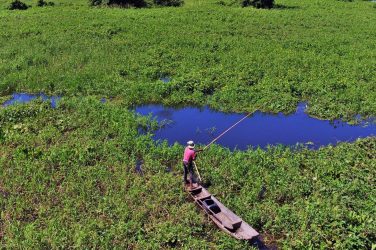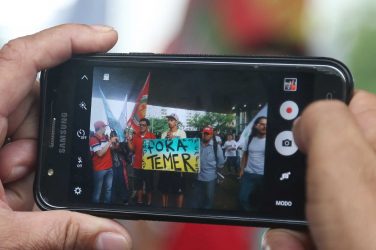Brazil is a young democracy. This is not a criticism or an excuse, but an observation.
While the country has had several democratically elected presidents in the 20th and 21st centuries, for most of Brazil’s history, wealthy land barons, so-called coronéis, have guided Brazil’s political and economic path directly or indirectly through their extensive influence.
Today, democracy is entrenched in Brazil after replacing the military government that controlled the country for two decades until the mid 1980s. Nevertheless, the remnants of the coronéis are still in play.
The evidence that oligarchs control vast empires in Brazil can be seen in the Lava Jato scandal and the numerous other investigations that have sprouted out of the plea bargain testimonies (delações premiadas) taken during the criminal proceedings.
Some of these oligarchs are being convicted and placed under house arrest or sent to prison, such as billionaire Marcelo Odebrecht and Eduardo Cunha, the ex-Speaker of the House and formerly one of Brazil’s most powerful politicians.
NGO Oxfam Brasil reports that the accumulated holdings of Brazil’s six wealthiest men is equal to the assets of half of Brazil’s population (100 million people). Brazil remains one of the worst countries in the world for income inequality.
Along with income inequality, other remnants of Brazil’s 19th century monarchy are evident, such as the country’s heavy import taxes and Byzantine tax structure. Brazil continues to prevent foreign competition from entering the local market. The World Bank ranks Brazil 123rd of 190 countries for “ease of doing business.”
As the philosopher George Santayana famously noted, “Those who do not learn history are doomed to repeat it.” The future of a country is dependent on its ability to learn from its historical errors.
The US has spent two hundred years distancing itself from the British monarchy that once ruled it. Brazil’s young democracy has been fully functional for a mere 30 years.
What does it mean to be young? When an individual is young, s/he makes bad decisions. Logic, experience, and delayed gratification are required to make informed decisions.
Actions that require advanced judgement are less likely to arise in children. An adult learns to make decisions based on long-range objectives. Maturity encourages us to exercise self-discipline, to forego indulgences now to produce a desired result in the future.
When children or adolescents make mistakes in judgment they are not to be blamed for their lapses. We do not hold children accountable for things they can’t be expected to grasp yet. No one can understand what s/he doesn’t know. A young democracy makes mistakes in judgment as well.
Brazilians are known for their spontaneity and creativity, sometimes referred to as the jeitinho brasileiro. Even the US still exhibits signs of its “youth,” e.g. egotism and a self-centered lack of foresight or international empathy.
In Brazil, youthful exuberance is on view everywhere from football matches to personal grooming. The country is the cosmetic surgery capital of the world. The long hair characteristic of little girls and adolescents in Western countries is popular among Brazilian women.
Facial hair on men is a new fashion. Demographically, Brazil, like most developing countries, is younger than developed countries. The majority of the population is under 30, whereas in the US, the majority of the population is over 30. Brazil is demographically young in addition to being a young democracy.
Brazilians are protective of their leisure time. Parties are a priority, whether it’s birthday parties with family members or drinking at the bar with colleagues after work. As one Brazilian told me, “A party is life.”
Catholic holidays are national holidays, so there are twice as many federal holidays than in the US. The Brazilian Constitution guarantees all workers 30 days of paid vacation per year, plus additional time off employees can accept or trade for cash.
There is no such vacation stipulation in the US Constitution. In the summer months, commerce slows as people work less and spend time at the beach with their families.
Another characteristic of a young democracy is xenophobia. In Brazil, only 1/3 of one percent of the population are foreign residents. Xenophobia is not surprising in a country that is attached to old customs.
Fear of outsiders is a basic human instinct like fear of the unknown. A young country makes mistakes, just as a child’s lack of experience may place the child in harm’s way, making decisions based on fear and short-term goals.
In the 21st century, thanks to trade agreements among nations, global commerce is the key to economic strength and stability. Xenophobia is bad for business.
A country that remains economically isolated is not situated for future growth, not to mention the resentment created among the populace toward the government when it’s forced to pay exorbitant taxes on all imported goods.
During the World Economic Forum, Brazil’s Finance Minister Henrique Meirelles stated that his country remains an isolated economy and hasn’t enjoyed all the perks of globalization.
Whether your politics are capitalist or socialist – favoring unrestricted movement of money or government regulations that exercise controls to combat income inequality – either way, countries require enormous capital to operate, the more the better.
A wealthy nation like the US with unrestricted capitalism offers large corporations and banks a guilt-free environment, allowing them to flourish until they reach the status of “too big to fail,” which guarantees them government protection from financial destruction.
So-called “neoliberal” economic policies offer low unemployment and low inflation until they reach a tipping point, such as the global recession of 2008.
On the other hand, a wealthy country like Norway, rich from oil exports, uses its wealth to guarantee a comfortable living standard for all its citizens, including excellent education and healthcare systems. University education is free to everyone in Norway, including international students.
The economic health of a country is measured by its GDP (Gross Domestic Product). When a country slips to zero or negative GDP growth (in Portuguese, PIB), it’s a recession, as happened in Brazil in 2015 and 2016.
GDP is calculated by measuring the percentage of growth the overall economy has shown compared to the previous year. Therefore, positive GDP numbers only occur if the latest data exceeds the previous data, i.e., if this year’s economy grows more than it did last year.
Hence, a country’s overall economic outlook is only considered healthy if it exceeds the previous year’s. The measuring stick is continual growth. A country that doesn’t show economic growth in each successive year is considered unhealthy and possibly unstable, depending on what measures politicians take to stimulate the economy.
Negative GDP numbers are devastating to a country. The numbers become the headline of every report on the evening news. Weak numbers often predict political instability, as seen in Brazil today. Negative GDP figures affect stock market values and real estate values; they also directly affect the amount of foreign investment.
Harder to calculate but easily visible, slower growth has an unambiguous effect on the psychological well-being of a country. When citizens believe their country’s economy is in danger, they are less likely to spend money.
When purchases stop or are delayed, a ripple effect echoes through every stratum of the country. It can sometimes be measured with an economic indicator known as the “consumer confidence rating.”
As with all youth, whether it’s children or a young democracy, missteps are inevitable. Luckily, Brazil’s economy is growing again this year, and the government would be wise to improve opportunities for entrepreneurs, making it easier to do business.
Additionally, it’s imperative to ease Brazil’s isolated economy. An economic plan that incorporates a global vision means long-term political stability for the country. However, this must be maintained within the framework of environmental sustainability.
Without a sustainable environment, there will be nothing to maintain. Stability and sustainability, along with prison terms for the corrupt oligarchs, is the key to Brazil’s vigor. The country’s future lies in the hands of the young, and with their diligence and care, democracy will continue to flourish.
B. Michael Rubin is an American living in Brazil. He’s the editor of the online magazine, Curitiba in English – http://curitibainenglish.com.br











